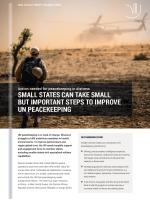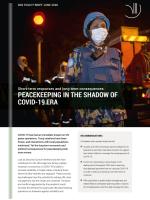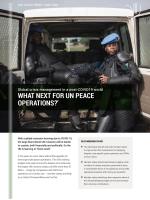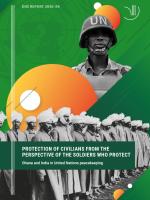Small states can take small but important steps to improve UN peacekeeping
Smaller member states can contribute to UN peacekeeping operations by:
■ offering critical enablers (intelligence expertise, tactical air transport, medical services) and working with larger troop contributors to enhance their capacity in these areas.
■ developing guidance materials, technological tools and additional training for troop contributors, e.g. on medical support, prevention of sexual abuse and data analysis.
■ if aid donors, triangulate with the UN and the World Bank to identify projects to sustain security in countries where UN forces are drawing down.
UN peacekeeping is in need of change. Missions struggle to fulfil ambitious mandates in hostile environments. To improve performance and regain global trust, the UN needs tangible support and engagement from its member states, including smaller states with specialized military capabilities.
Recent studies show that United Nations peace operations save lives and often offer better value -for-money than other multinational stabilization missions. At the same time, it is widely understood both inside and outside the UN that peacekeeping needs fundamental reform. The UN’s four main missions in Africa - in Mali, South Sudan, the Central African Republic and the Democratic Republic of Congo (DRC)– often lack the political capital and military heft to contain major violence and advance faltering peace processes.
Against this backdrop, Secretary-General Antonio Guterres launched his initiative ‘Action for Peacekeeping’ (A4P) in March 2018 as a plea for Member States to recommit to UN peacekeeping and help:
■ refocus peacekeeping with realisticexpectations
■ make peace operations stronger and safer
■ mobilize greater support for political solutions and for well-structured, well-equipped,well-trained forces.
A4P presented no radical proposals about the future of UN peace operations but has turned out to be a useful framework for the UN secretariat in pursuing a range of reforms on issues such as assessing the performance of peacekeeping units and improving the safety of peacekeepers. Moreover, at a time when great-power rivalry and rifts in the Security Council are standing in the way of larger questions being addressed, A4P offers a useful set of openings for medium- and small-sized member states that are aiming to strengthen existing UN operations.
Direct and indirect contributions to improving UN peace operations
The A4P framework highlights a number of areas where the UN urgently needs concrete assistance from its member states. One of the most prominent is ‘tailored, context-specific peacekeeping approaches to protecting civilians.’ To move towards approaches that are better suited to local conditions, UN missions need both a better grasp of the political dynamics that shape violence and the capacity to deploy sufficient forces to endangered communities fast. This includes strengthening civilian activities - such as promoting political dialogue and human rights monitoring etc. that underpin the protective work of missions. In military terms, it also means prioritising intelligencedriven and flexible operations to protect communities, rather than adopting static defensive postures. Smaller troop contributors have been instrumentalin translating this into practice by 1) providing intelligence expertise and tactical airlift, as the Nordic countries have done in Mali, and 2) deploying special forces contingents.
Since September 2018, 152 member states and four regional organizations have endorsed the A4P declaration. The declaration contains 45 ‘commitments’ across eight thematic fields that member states and the Secretariat promise to work on both individually and collectively in order to adapt UN peacekeeping to complex, high-risk environments. The eight A4P themes are:
1. Advance political solutions to conflict and enhance the political impact of peacekeeping
2. Implement the Women, Peace and Security agenda
3. Strengthen the protection provided by peacekeeping operations
4. Improve the safety and security of peacekeepers
5. Support effective performance and accountability by all peacekeeping components
6. Strengthen the impact of peacekeeping on sustaining peace
7. Improve peacekeeping partnerships to enhance collaboration and planning
8. Strengthen the conduct of peacekeeping operations and personnel.
Intelligence and protection
Small states could also assist the UN by helping larger troop contributors improve the quality of their protective work. In addition to training and capacity-building, there are numerous ways of doing this, including 1) deploying small groups of military protection experts (including special forces personnel) to provide intelligence and planning support to larger UN contingents; and 2) offering case-specific training on protection issues, such as understanding local conflict dynamics in remote areas, for UN units deploying to challenging environments.
Communications assistance
UN officials highlight two other areas where member states could provide assistance. One (mentioned in the A4P declaration) is to provide strategic communications assistance to UN missions. This entails engaging local communities to manage unrealistic expectations of the mission’s role and mandate. Another (not in the A4P document, but much discussed at UNHQ) is to help the UN work out how to use new technologies – like big data from social media – to recognize and assess threats. Member states could deploy civilian and/or military experts on communications and data-driven operations to UN operational headquarters to help fill these gaps.
UN peacekeeping is a remarkable enterprise of multilateralism and international solidarity. Action by the Secretariat alone is not enough to meet the challenges we face.
Medical aid
The safety and security of peacekeepers in dangerous environments like Mali is another A4P priority. The UN has made progress in reducing the number of peacekeepers killed by improvised explosive devices (IEDs), such as roadside bombs. UN medical services have also been improved with the help of member states. This has ranged from large-scale initiatives to establish high-quality field hospitals, as the UK and Vietnam have done in South Sudan, to smaller scale guidance, like sharing military medical field manuals with the UN: Israel, for example, gave the UN secretariat its standard manual for immediate first aid in the field. Member states can also channel medical trainers and guidance through the UN’s recently established medical center at Entebbe, Uganda.
UN peacekeeping operations 2020
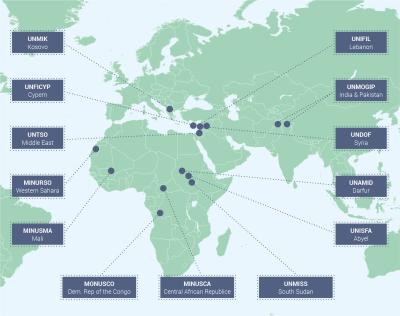
Improving conduct and sustaining peace
Apart from providing troops and equipment, small states can assist the UN in 1) improving the conduct and discipline of peacekeepers; and 2) linking bluehelmet operations to long-term efforts to ‘sustain peace’ in the countries where they serve. The UN has highlighted a need for more community liaison teams to address discipline problems, such as sexual abuse by peacekeepers, and member states could work with the secretariat to develop these.
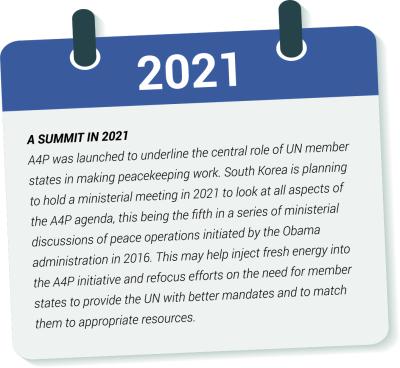
A4P also highlights the need for member states to help ensure that ‘transitions from peacekeeping operations’ are successful. This entails working to ensure that peace is sustained after the peacekeeping operation has been withdrawn and the UN has reconfigured its engagements in the country. This is especially important in cases such as Sudan and the DRC, where such transitions are on the short- or medium-term horizon and where the UN military missions may be replaced by some form of special political mission or peacebuilding mission. Member states can assist the UN by increasing bilateral security assistance to the affected countries (by, for example, tailoring security-sector reform efforts to enhance the legitimacy of local authorities) and putting pressure on multilateral actors such as the World Bank to invest additional resources in peacebuilding. By bringing resources to bear in this way, even countries that do not deploy many peacekeepers can boost peacekeeping.
